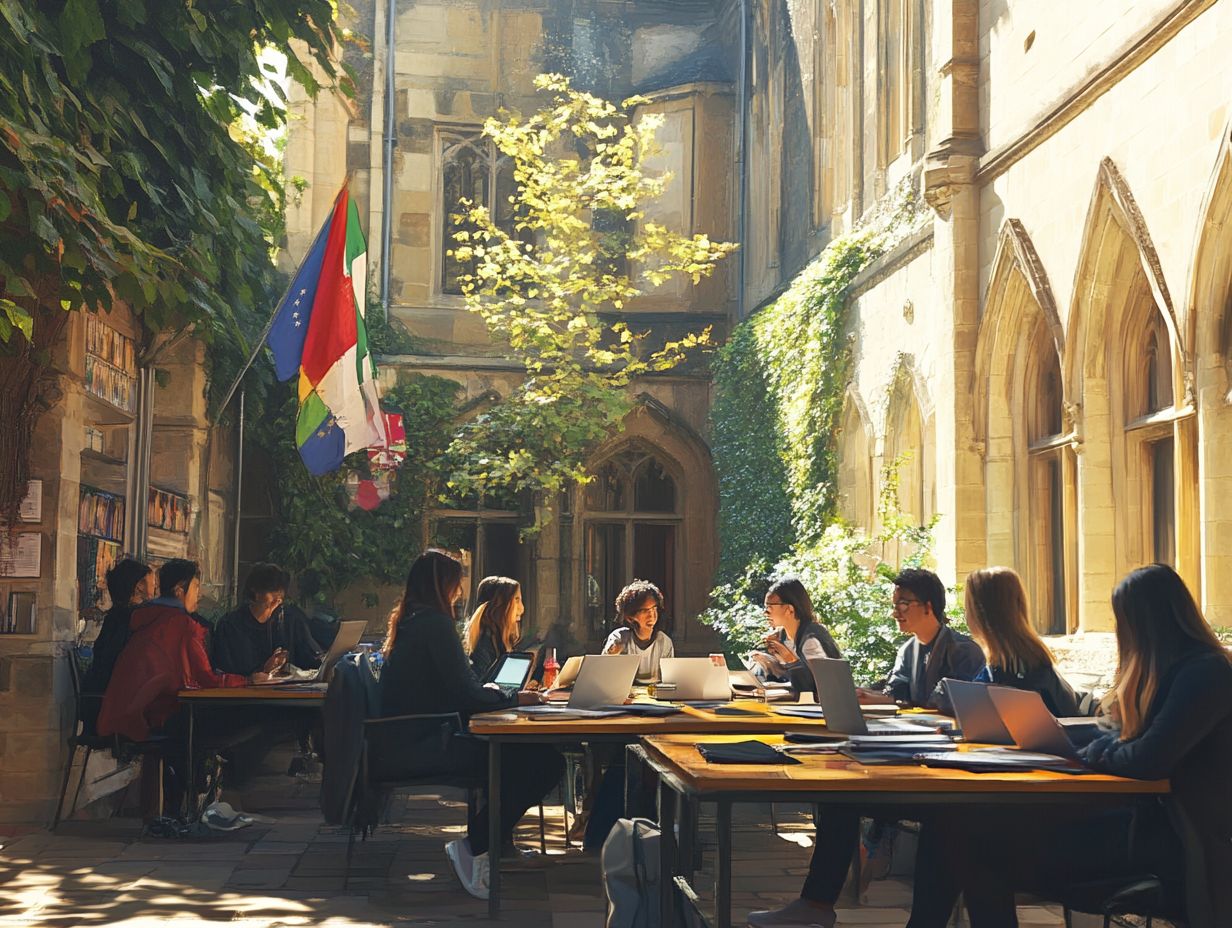A Guide to Studying in Europe for International Students
Studying in Europe presents an exceptional opportunity. It combines world-class education with rich cultural experiences that elevate your academic journey.
This guide will help you, an international student, navigate the essential steps of studying in Europe. You’ll grasp the application process, visa requirements, and explore financial support through scholarships and part-time work.
Learn how to select the right university and program. Adapt to a new cultural environment and embrace your study abroad experience, including travel opportunities!
Dive in to uncover how Europe can be the perfect backdrop for your academic adventure!
Contents
- Key Takeaways:
- Application Process for International Students
- Financing Your Studies in Europe
- Choosing the Right University and Program
- Living and Adjusting to Life in Europe
- Making the Most of Your Study Abroad Experience
- Frequently Asked Questions
- What are the benefits of studying in Europe as an international student?
- What are the main requirements for international students to study in Europe?
- What are the most popular destinations for international students in Europe?
- What are the main challenges that international students may face while studying in Europe?
- Are there any scholarships or financial aid options available for international students studying in Europe?
- What is the process for obtaining a student visa to study in Europe?
Key Takeaways:

- Europe offers a diverse and high-quality education, making it an attractive study destination.
- The application process may vary, but common requirements include a visa and meeting admission deadlines.
- Financing options such as scholarships and part-time work are available for international students.
- Consider factors like location and reputation when choosing a university and program.
- Embrace cultural differences and maximize your study abroad experience through travel!
Why Choose Europe as a Study Destination?
Choosing Europe opens doors to a wealth of advantages. It has a rich tapestry of cultures and esteemed academic institutions.
Participate in the Erasmus+ program to study across borders and enrich your academic journey.
European education is world-class, with rigorous standards and innovative teaching methods. Countries like Germany and the Netherlands are known for engineering programs, while the UK and France excel in the arts.
Explore vibrant cities like Barcelona and enjoy the calm of Norway.
Many institutions offer scholarships for international students. This makes pursuing your dreams possible without overwhelming debt.
Application Process for International Students
Navigating the application process can be complex yet rewarding. Pay attention to details and follow the specific guidelines set by academic institutions.
Gather essential documents, such as proof of financial means and meet admission requirements. Remember, applying for a student visa varies by country and adds another layer to the process.
Being informed about application deadlines ensures a smooth transition into European higher education.
Visa Requirements and Application Process
Visa requirements for international students aiming to study in Europe vary by country and nationality. Understanding these requirements is crucial for a successful application.
Each European country has specific regulations regarding student visas. Typically, you’ll need proof of financial means, acceptance into an academic institution, and sometimes language proficiency.
Some countries may have unique requirements that you need to keep in mind. For instance, if you re planning to study in Germany, you often need to show sufficient financial resources by providing bank statements or scholarship letters.
On the other hand, students heading to France might be asked to present a comprehensive medical insurance policy. The application process usually involves filling out an online form and gathering the necessary documentation.
You may also need to attend an interview at the nearest embassy or consulate. To streamline this process, stay organized and consult official government websites for the latest requirements.
Universities often provide assistance for visa applications, making it easier for you.
Admission Requirements and Deadlines
Admission requirements for studying in Europe can vary significantly between academic institutions. Generally, you ll need to provide documentation like transcripts, proof of language proficiency, and occasionally letters of recommendation.
Be aware that application deadlines can vary widely by country. For instance, some universities in the UK expect submissions by January for courses starting in September.
Many German institutions may push deadlines as far back as mid-July. Start your application today to give yourself ample time to gather the necessary documents.
Preparing for any language tests and tackling visa requirements is essential. Some countries, like France and the Netherlands, may have unique entrance exams or interviews that add complexity to your application journey.
Financing Your Studies in Europe

Financing your studies in Europe can be a significant concern for international students. Tuition fees vary greatly by country and make up a huge part of your overall cost of living.
Fortunately, a wealth of financial aid options is available, including scholarships and part-time work opportunities. These resources can effectively lighten the financial load while you pursue your education across various European countries.
Scholarship Opportunities
Many scholarship opportunities exist for international students in Europe. These scholarships can significantly reduce tuition fees and living costs.
Many European countries and universities offer targeted scholarships designed to attract talented international students, encompassing both merit-based aid and need-based financial support.
For instance, Germany provides the DAAD scholarship, while the Netherlands boasts numerous programs offering funding for a wide range of degrees. To uncover these valuable resources, explore university websites, scholarship databases, and education fairs that cater to your interests.
The application processes generally require you to submit transcripts, recommendation letters, and personal statements. There are countless success stories of students from developing countries who have received the Erasmus Mundus scholarship.
These students thrive in their academic endeavors while immersing themselves in diverse cultural experiences in their host nations.
Part-time Work Options
International students in Europe can find valuable part-time work options. These jobs help support education and manage living costs while providing essential work experience.
In the UK, for instance, you can work up to 20 hours per week during term time. Many students secure roles in the hospitality sector or retail fields that are both popular and accessible.
Meanwhile, in countries like Germany and the Netherlands, similar working hours are allowed. There s also a strong emphasis on job versatility, allowing you to explore internships that align with your field of study, enriching your academic journey with practical experience.
Managing work and school can be challenging, but with effective time management and prioritization, many students thrive both academically and professionally.
Choosing the Right University and Program
Selecting the right university and program is a pivotal choice for international students aiming to study in Europe. This decision can significantly shape your educational journey, career prospects, and personal development.
Consider aspects such as the university’s reputation, the range of bachelor s and master s programs, and available specializations. These can profoundly influence your future opportunities.
Factors to Consider
When choosing a university in Europe, consider several key factors for an enriching education experience. Think about the university’s reputation, the quality of academic programs, and the overall campus environment and culture.
The location of the institution is vital; proximity to industry hubs can open doors to valuable networking opportunities and internships.
Also, review the specific course content to ensure it aligns with your career aspirations. Faculty qualifications matter too; experienced educators can enhance your learning experience with insights and connections.
Strong student support services, like counseling and extracurricular activities, can greatly impact your academic journey. Balancing these elements against your personal needs and future goals is essential for a well-informed decision.
Living and Adjusting to Life in Europe

Embarking on your journey in Europe is thrilling! However, it comes with challenges you need to navigate. Adjusting to life often requires managing cultural differences and the cost of living in a new environment.
By immersing yourself in the local customs, language, and lifestyle, you can enhance your educational experience and foster personal growth.
Cultural Differences and Tips for Adaptation
Cultural differences can shape the experiences of international students in Europe. Understanding and adapting to new social norms is essential. Embracing these differences enriches your educational journey and fosters meaningful interactions with local communities.
As you navigate diverse customs, you’ll encounter unique attitudes toward time, communication styles, and even dining etiquette. Some cultures prioritize punctuality, while others have a more laid-back approach.
To bridge these cultural gaps, approach new situations with an open mind and a flexible attitude. Seeking support from both local and international student networks can provide invaluable insights to help you acclimate more easily.
Engaging in local events or participating in cultural exchange programs can facilitate connections, ensuring you feel more at home as you explore your new surroundings.
Making the Most of Your Study Abroad Experience
Maximizing your study abroad experience in Europe is about more than just hitting the books; it s about embracing every opportunity for travel and getting to know the culture.
Engaging with the vibrant local culture and exploring various European countries can elevate your educational journey and create memories that will last a lifetime. By forging connections with fellow international students, you enhance your experience even further.
Travel Opportunities and Cultural Immersion
As an international student studying in Europe, you ll love how easy it is to visit incredible historical sites. These travel opportunities are abundant and offer a remarkable chance for cultural immersion beyond the classroom.
Exploring vibrant cities like Paris, Rome, and Barcelona enhances your academic experience through firsthand encounters with art, history, and architecture. Stepping out of your comfort zone fosters personal growth while engaging in local traditions and savoring authentic cuisine.
Participating in festivals allows you to form deeper connections and gain a richer understanding of different lifestyles. Timing your trips around educational holidays or weekends can elevate these enriching experiences.
With each adventure, you ll cultivate valuable life skills such as adaptability, communication, and the ability to effectively communicate and interact with people from different cultures essential tools for navigating today s global landscape.
Frequently Asked Questions
What are the benefits of studying in Europe as an international student?

Studying in Europe offers a unique and diverse educational experience in a multicultural environment. You also gain access to top-ranked universities and a wide range of academic programs.
What are the main requirements for international students to study in Europe?
Requirements vary by country and university. Generally, international students must provide proof of academic qualifications, language proficiency, and financial support.
What are the most popular destinations for international students in Europe?
Popular destinations include the United Kingdom, Germany, France, and Spain. Other countries like the Netherlands and Sweden are also increasingly favored.
What are the main challenges that international students may face while studying in Europe?
Language barriers, cultural differences, and adjusting to a new environment are common challenges. It s important to research and prepare for these before studying in Europe.
Are there any scholarships or financial aid options available for international students studying in Europe?
Yes, many universities in Europe offer scholarships or financial aid specifically for international students. Many external organizations and government programs also offer funding for studying in Europe.
What is the process for obtaining a student visa to study in Europe?
The visa process varies by country. Generally, international students need to apply for a student visa at the embassy or consulate in their home country. This requires proof of acceptance to a university, financial support, and a valid passport.
Start planning your exciting journey today!




